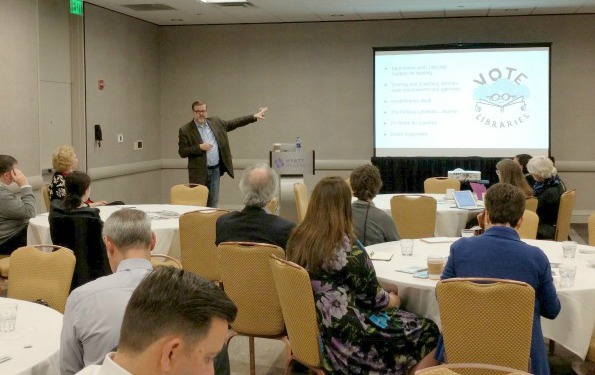2018 School Spending Survey Report
Lilead Fellows, EveryLibrary Share Out ESSA Strategies | ALA Midwinter 2017
Final state plans are due by April 4. Here's the advice that came out of the Lilead Fellows community meeting at Midwinter.
 Just hours before ALA Midwinter got underway last month in Atlanta, GA, Lilead Project director Ann Carlson Weeks of the University of Maryland iSchool welcomed attendees to the first Lilead Fellows community meeting. In keeping with the mission of the Lilead Fellows Project to make school library district supervisors a network of change agents, Weeks described the meeting’s purpose as “helping you to be enabled and equipped to make change in your states.” She introduced John Chrastka, executive director of EveryLibrary, to lead the audience of Lilead Fellows, corporate partners, and other stakeholders through a strategic approach to activism, addressing the opportunity that the Every Student Succeeds Act (ESSA) provides for school library programs at the state level. Chrastka invoked the Archimedes metaphor about being able to move the world if one has a place to stand and a long enough lever. With ESSA, school librarians now have solid footing to engage in dialogue with state decision makers. Building a coalition and negotiating are the levers that can result in targeted change. For many, that change includes bringing the AASL definition of effective school library programs into state regulations and activating the language that includes school librarians as specialized instructional support personnel eligible for professional development and other grants.
Just hours before ALA Midwinter got underway last month in Atlanta, GA, Lilead Project director Ann Carlson Weeks of the University of Maryland iSchool welcomed attendees to the first Lilead Fellows community meeting. In keeping with the mission of the Lilead Fellows Project to make school library district supervisors a network of change agents, Weeks described the meeting’s purpose as “helping you to be enabled and equipped to make change in your states.” She introduced John Chrastka, executive director of EveryLibrary, to lead the audience of Lilead Fellows, corporate partners, and other stakeholders through a strategic approach to activism, addressing the opportunity that the Every Student Succeeds Act (ESSA) provides for school library programs at the state level. Chrastka invoked the Archimedes metaphor about being able to move the world if one has a place to stand and a long enough lever. With ESSA, school librarians now have solid footing to engage in dialogue with state decision makers. Building a coalition and negotiating are the levers that can result in targeted change. For many, that change includes bringing the AASL definition of effective school library programs into state regulations and activating the language that includes school librarians as specialized instructional support personnel eligible for professional development and other grants. 
John Chrastka speaks to attendees at the Lilead Fellows community meeting.
Strategies that work
Chrastka encouraged the audience to think about joining or building local coalitions that have values and concerns in common with school librarians. Identifying connections with other groups, finding an entry point for discussion and partnership, and focusing efforts on common goals results in a stronger voice that increases authority with policy makers. Successfully negotiating change starts with a simple premise. Chrastka emphasized that “decisions are made by the people who show up,” citing progress in Illinois, Idaho, and Virginia as examples. His advice? Do your homework. First, define the problem and develop a goal. Then, determine what agency or entity is responsible for changing, amending, or adding educational administrative regulations in your state. Finally, identify the specific person or office to approach and communicate how your goal is aligned with their priorities.The art of securing funds
Fund requests require you to suss out more specific information. You must identify which committee appropriates the money, find out if funding exists that should be reappropriated, or whether new funding should be established, and then pinpoint legal or regulatory authorizations already in place that your request can be tied to. Throughout the presentation, small group discussions put the strategies in context for local situations, and participants shared their own experiences and challenges. Chrastka suggested that sometimes multiple interactions over time are needed to see success. Your message will become stronger if you consistently refer to previous conversations. In conclusion, Chrastka shared helpful tools and resources, and urged everyone to commit to at least one concrete step to further their objectives. Library leaders are encouraged to explore what actions have taken place to date in their states, and read and respond to drafts of ESSA plans as they become available. Final state plans are due to the federal government by April 4, 2017.Priscille Dando is coordinator, library information services at Fairfax County (VA) Public Schools and a Lilead Fellow. Application information for the next cohort of Lilead Fellows is now available.
RELATED
RECOMMENDED
CAREERS
The job outlook in 2030: Librarians will be in demand
CAREERS
The job outlook in 2030: Librarians will be in demand
ALREADY A SUBSCRIBER? LOG IN
We are currently offering this content for free. Sign up now to activate your personal profile, where you can save articles for future viewing





Add Comment :-
Be the first reader to comment.
Comment Policy:
Comment should not be empty !!!